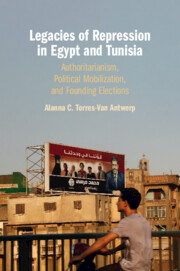 Legacies of Repression in Egypt and Tunisia
Legacies of Repression in Egypt and Tunisia Book contents
- Legacies of Repression in Egypt and Tunisia
- Legacies of Repression in Egypt and Tunisia
- Copyright page
- Dedication
- Contents
- Figures
- Tables
- Acknowledgments
- Introduction
- 1 Authoritarian Politics and Founding Elections
- Part I Members of the Club or the Only Game in Town?
- Part II Phoenix from the Ashes
- Part III Epilogue
- 6 When the Dust Settles
- 7 Authoritarian Legacies and the Prospects for Democratic Consolidation
- Appendix
- References
- Index
7 - Authoritarian Legacies and the Prospects for Democratic Consolidation
from Part III - Epilogue
Published online by Cambridge University Press: 10 March 2022
- Legacies of Repression in Egypt and Tunisia
- Legacies of Repression in Egypt and Tunisia
- Copyright page
- Dedication
- Contents
- Figures
- Tables
- Acknowledgments
- Introduction
- 1 Authoritarian Politics and Founding Elections
- Part I Members of the Club or the Only Game in Town?
- Part II Phoenix from the Ashes
- Part III Epilogue
- 6 When the Dust Settles
- 7 Authoritarian Legacies and the Prospects for Democratic Consolidation
- Appendix
- References
- Index
Summary
Chapter 7 concludes the book by revisiting key claims and discussing the implications of the research for broader debates in the fields of comparative politics, social movements, and democracy-promotion activities. Here we see that much of the focus of democracy promotion institutions and programs may be misplaced. Rather than focusing on existing political parties in hybrid regimes, as many democracy-promotion programs do, it is repressed societal actors that are more likely to mobilize supporters, win elections, and form the first government after an authoritarian ouster. These are the individuals and groups most in need of skills-building and governance training. Furthermore, much of the programmatic emphasis of democracy-promotion work falls on enhancing the “liberal” qualities of democracy: freedom of speech, human rights, inclusion of women and minorities, and the protection of civil liberties. However, what the cases here show is that democratic consolidation is most threatened by unmet benchmarks in economic and physical security after the fall of an authoritarian regime. When these benchmarks are not met, the support for democracy declines and a wedge is opened for the return of authoritarian actors. The chapter offers suggestions for future research based upon the findings.
Keywords
- Type
- Chapter
- Information
- Legacies of Repression in Egypt and TunisiaAuthoritarianism, Political Mobilization, and Founding Elections, pp. 273 - 284Publisher: Cambridge University PressPrint publication year: 2022
